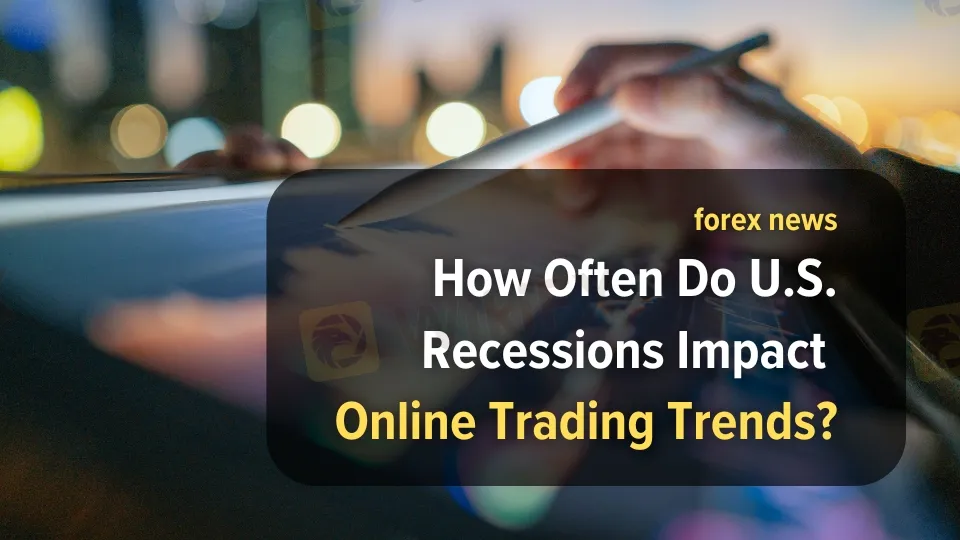How Often Do U.S. Recessions Impact Online Trading Trends?
Abstract:How U.S. economic resilience and declining recession rates are shaping online trading trends, influencing market behavior, and driving investor strategies.

Since the Great Financial Crisis wrapped up in 2009, the U.S. economy has shown remarkable resilience. In the last 15-and-a-half years, the economy has been officially in recession for only two months—just 1% of the time. Despite occasional bumps along the way, this stability reflects a noticeable decline in how often recessions occur, which is shaping the broader economy and influencing stock market trends.
A Look Back at U.S. Recessions
Recessions were far more common in the early 20th century. According to the National Bureau of Economic Research (NBER), the U.S. economy faced frequent recessions during the first 40 years of the century. It took massive events, like World War II, to fundamentally reshape the economic landscape.
Today‘s economy is much more dynamic and complex, with robust systems in place that didn’t exist back then. While economic data from over a century ago may not be flawless, the trend is clear: the economy contracts less frequently now, thanks to advances in economic policy and stability.

The Stock Market and the Economy: Two Different Beasts
Although the stock market and the economy arent the same, economic downturns often trigger bear markets. A bear market occurs when stock prices drop 20% or more from recent highs. Historically, bear markets were more frequent in the early 1900s. For instance, the 2010s became the first decade to avoid both a recession and a bear market—an extraordinary achievement in terms of economic steadiness.
Still, its important to note the difference between recessions and bear markets. In 2022, while there was no official recession, the stock and bond markets experienced a significant bear market. This highlights the inherent volatility of financial markets, even during periods of broader economic stability.

Building Economic Resilience
Several factors have helped reduce the frequency of recessions in recent years. Policymakers now have modern tools to manage economic fluctuations, such as adjusting interest rates or deploying government stimulus programs. These measures help soften the blow of economic slowdowns.
However, theres a potential downside to this stability. Prolonged periods without a recession might create vulnerabilities, making future downturns more severe. Some experts worry that delaying economic contractions could lead to bigger crises down the line.
Even without a full-blown recession, specific industries can still face economic challenges. For example:
- Tech: The tech sector went through a mild recession in 2022.
- Housing: The housing market is currently experiencing a downturn.
- Energy: Over the past decade, the energy sector has endured multiple boom-and-bust cycles.
These industry-specific slowdowns remind us that while the overall economy may be stable, pockets of trouble can still emerge. Policymakers and businesses must stay vigilant to adapt and remain resilient.
What It Means for Global Markets
The stability of the U.S. economy has a ripple effect on global markets. As the worlds largest economy, the U.S. sets the tone for international trade and investment. A strong U.S. economy inspires confidence among global investors and reduces market volatility. On the flip side, signs of a looming U.S. recession can spark widespread concern, impacting foreign stock markets and trade relationships.
Impact on Online Trading
Economic trends and market conditions significantly influence online trading behavior. During stable times, investors tend to focus on growth stocks and build diversified portfolios with a long-term perspective. However, during recessions or bear markets, online trading activity often spikes as traders look to seize opportunities in volatile conditions.
The rise of retail trading platforms has also made the stock market more accessible, allowing everyday investors to react quickly to economic news and market changes. This has made online trading more dynamic, with real-time events shaping how people invest.
Final Thoughts
The U.S. economys reduced vulnerability to recessions is a sign of progress toward greater stability and resilience. Yet, economic cycles are inevitable, meaning recessions and bear markets will always play a role in the financial landscape. Understanding the differences between these events and their effects on industries and markets is crucial.
While economic downturns may happen less often, their potential severity underscores the need for preparation. Whether its through smart investments or sound economic policies, staying ahead of the curve is key to navigating future challenges.

Read more

Axi Reveals Game-Changing Edge Score Tool to Elevate Traders
Axi launches the Edge Score Explainer, a tool providing traders with real-time insights, personalized metrics, and actionable data to enhance trading performance.

High Risk, High Returns: Is This True?
Leverage is one of the most talked-about tools in trading. It promises big returns but comes with huge risks. Traders often wonder if leverage is a blessing or a curse. There are arguments on both sides. Some traders believe it is a game-changer. Others think it can ruin your account. What is your take on this?

Hong Kong Stablecoins Regulation Updates for 2025
Hong Kong's new stablecoin regulation bill and crypto licensing system aim to strengthen HKMA oversight, ensuring secure cryptocurrency trading and market stability.

Is eToro Leaving London to Focus on a $5B U.S. IPO in 2025?
eToro plans a $5B U.S. IPO in 2025, shifting focus from London to the U.S. market. Discover details on eToro's valuation, SEC filing, and future in fintech.
WikiFX Broker
Latest News
IG Japan Extends US Stock CFD Trading Hours in 2025
ALERT! Warning against Livaxxen
Which Zodiac Sign Makes the Best Trader?
Plus500 Collaborates with Topstep, Prop firm
Robinhood Launches Crypto Trading Services in Spain
Archax Secures FCA Approval to Oversee Crypto Promotions in the UK
CLS Global Admits to Crypto Fraud
Philippine SEC Urges Caution Regarding Ecomamoni
Become Women Brand Ambassador of Yamarkets
Naira Falls Against Dollar as Nigeria Reshapes Economic Blueprint
Rate Calc

